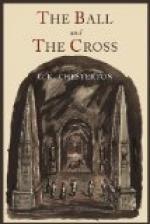They had run another half mile or so when it became apparent that they were entering a sort of scattered village. One or two whitewashed cottages and even a shop had appeared along the side of the road. Then, for the first time, Turnbull twisted round his red bear to get a glimpse of his companion, who was a foot or two behind, and remarked abruptly: “Mr. MacIan, we’ve been going the wrong way to work all along. We’re traced everywhere, because everybody knows about us. It’s as if one went about with Kruger’s beard on Mafeking Night.”
“What do you mean?” said MacIan, innocently.
“I mean,” said Turnbull, with steady conviction, “that what we want is a little diplomacy, and I am going to buy some in a shop.”
XI. A SCANDAL IN THE VILLAGE
In the little hamlet of Haroc, in the Isle of St. Loup, there lived a man who—though living under the English flag—was absolutely untypical of the French tradition. He was quite unnoticeable, but that was exactly where he was quite himself. He was not even extraordinarily French; but then it is against the French tradition to be extraordinarily French. Ordinary Englishmen would only have thought him a little old-fashioned; imperialistic Englishmen would really have mistaken him for the old John Bull of the caricatures. He was stout; he was quite undistinguished; and he had side-whiskers, worn just a little longer than John Bull’s. He was by name Pierre Durand; he was by trade a wine merchant; he was by politics a conservative republican; he had been brought up a Catholic, had always thought and acted as an agnostic, and was very mildly returning to the Church in his later years. He had a genius (if one can even use so wild a word in connexion with so tame a person) a genius for saying the conventional thing on every conceivable subject; or rather what we in England would call the conventional thing. For it was not convention with him, but solid and manly conviction. Convention implies cant or affectation, and he had not the faintest smell of either. He was simply an ordinary citizen with ordinary views; and if you had told him so he would have taken it as an ordinary compliment. If you had asked him about women, he would have said that one must preserve their domesticity and decorum; he would have used the stalest words, but he would have in reserve the strongest arguments. If you had asked him about government, he would have said that all citizens were free and equal, but he would have meant what he said. If you had asked him about education, he would have said that the young must be trained up in habits of industry and of respect for their parents. Still he would have set them the example of industry, and he would have been one of the parents whom they could respect. A state of mind so hopelessly central is depressing to the English instinct. But then in England a man announcing




